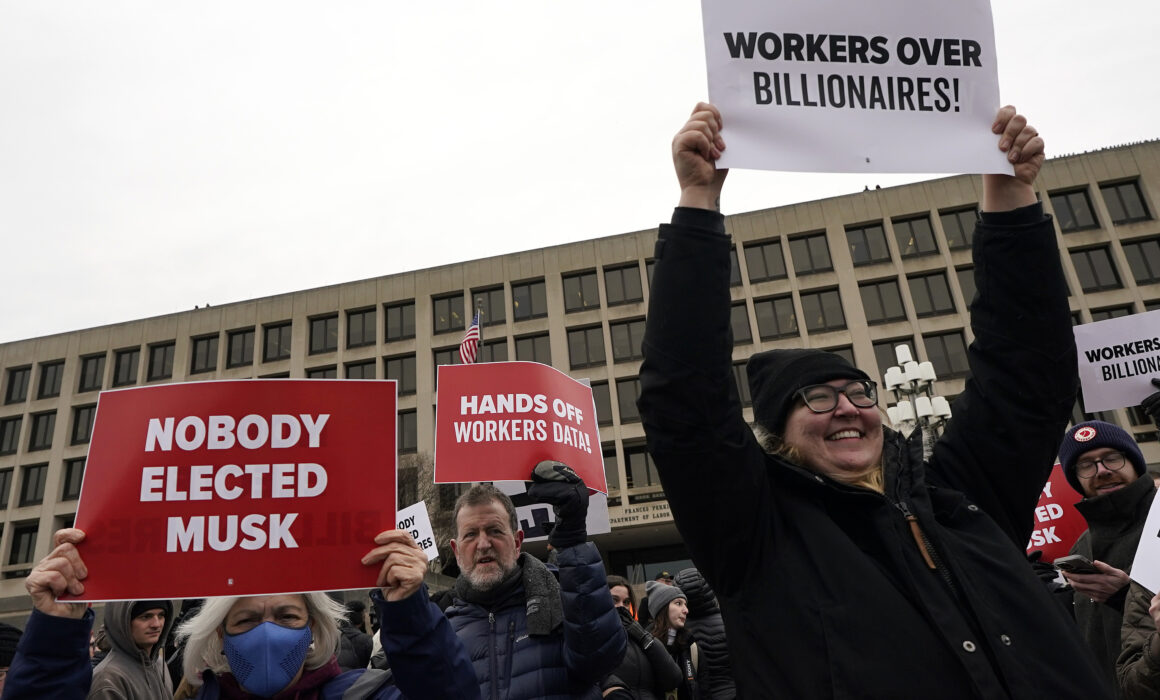Private Actors Are Threatening Public Institutions
February 7, 2025
How Elon Musk has endangered the global financial system
The Roosevelt Rundown features our top stories of the week.

Workers and supporters protest the Department of Government Efficiency in front of the US Department of Labor on February 5, 2025. (Al Drago/Getty Images)
“Move Fast and Break Things” Indeed
Elon Musk’s incursion into the US Treasury’s payment system “is even more dire than it might appear,” Roosevelt Fellow Graham Steele and Program Director Emily DiVito, both former Treasury officials, warn in Bloomberg Tax. Under the pretense of “government efficiency,” Musk’s involvement constitutes an unprecedented security breach in an institution that depends on its reputation for safety and stability. Compromising the Treasury, Steele and DiVito write, “could have widespread effects on our nation’s financial stability, jeopardize the livelihoods of millions of Americans, and undermine the public’s confidence in our entire financial system.”
Multiple financial institutions that deal in public trust are now under threat:
- The Federal Deposit Insurance Corporation (FDIC), which the Trump administration is considering eliminating, undergirds the entire financial system by protecting bank customers’ deposits and stabilizing the banking system in times of crisis. Without the FDIC, the next banking crisis could kick off a domino effect of consumer panic if people can’t be certain that their money is protected.
- Treasury bills sit at the foundation of the global financial system because they are regarded as unquestionably safe investments. But by threatening to stop Treasury payments according to his political whims, Musk undermines the trust the system relies on. “The Silicon Valley ethos of ‘move fast and break things’ is a reckless and dangerous approach to the world’s safest financial asset,” Steele and DiVito emphasize.
- The Consumer Financial Protection Bureau (CFPB), which was founded after the Great Recession to counteract financial abuses, is also reportedly in danger of eradication. Removing consumer protections augments the fragility of the overall financial system, potentially exacerbating future crises.
The bottom line: “The government’s failing to make payments doesn’t amount to cutting spending; it’s a default on our obligations. It would have ripple effects for our nation’s credit rating, borrowing costs, and the Treasury markets. Ultimately, it would destabilize the global financial system.”
Read their full breakdown: “Musk’s Treasury Incursion Puts Entire Financial System at Risk”
Jobs Day Data Are Statistically Reliable (for Now)
Today’s Jobs Day report reflected 143,000 new jobs added in January, the last employment data of the Biden administration. The Labor Department also published revisions to data from last year, but this is no cause for alarm, as Roosevelt Principal Economist Michael Madowitz explained earlier this week.
Revisions to prior data releases are a normal part of the process. “Timeliness and accuracy are usually competing objectives in statistical surveys (and in life!), but statistical agencies strike a balance by releasing the best estimates possible as fast as possible and regularly updating these estimates,” Madowitz noted. These revisions are “a sign that statistics are being collected and published faithfully and agencies are being transparent about previous misses.”
To be sure, reliable data should not be taken for granted. But moving forward, it will be important to be able to distinguish between data that are confusing on their face and data that have actually been tampered with.
Read the blog post: “Why Economic Data Revisions Mean Better Statistics”
What We’re Talking About
What We’re Reading
- It’s no coincidence that the political ascendance of tech billionaires has accompanied waves of both rampant misogyny and resistance to regulation, Suzanne Kahn, senior vice president of Roosevelt’s think tank, observes in Ms Magazine: “We are learning just how deeply offended powerful men are by the idea that any limits might be placed on them. Faced with the most basic oversight, they have lashed out, determined to take bodily and economic autonomy away from the rest of us.”
- Corporations’ apparent eagerness to roll back diversity, equity, and inclusion policies demonstrates that they never truly intended to take them seriously.
- “What we’re seeing in the moment is the few companies who took it to heart . . . and the many who just wanted to sprinkle some DEI on top, especially after George Floyd,” says Roosevelt Fellow Portia Allen-Kyle. “And that was never going to be a viable strategy.”
- A new First Street study reports that the climate crisis could cost an estimated $1.5 trillion in real estate value as insurers factor in climate risk and homebuyers avoid wildfire- or flood-prone areas.
